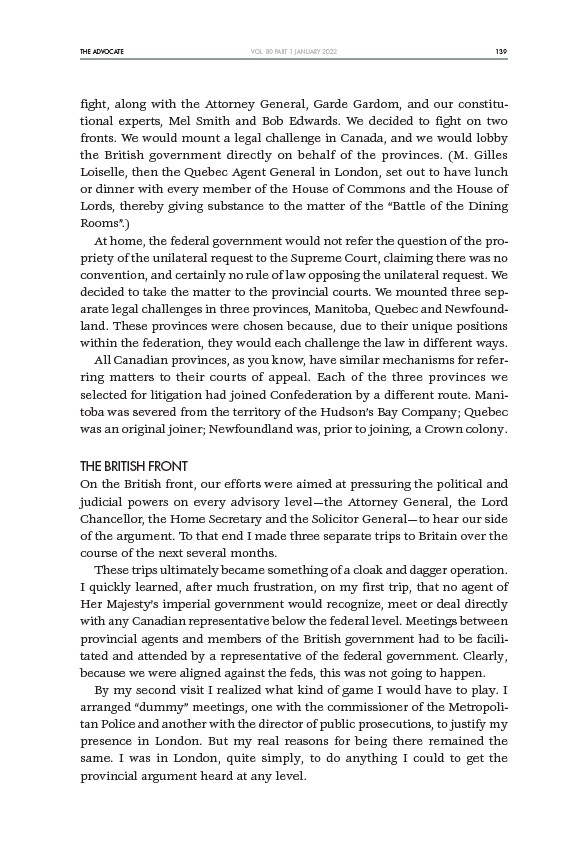
THE ADVOCATE 139
VOL. 80 PART 1 JANUARY 2022
fight, along with the Attorney General, Garde Gardom, and our constitutional
experts, Mel Smith and Bob Edwards. We decided to fight on two
fronts. We would mount a legal challenge in Canada, and we would lobby
the British government directly on behalf of the provinces. (M. Gilles
Loiselle, then the Quebec Agent General in London, set out to have lunch
or dinner with every member of the House of Commons and the House of
Lords, thereby giving substance to the matter of the “Battle of the Dining
Rooms”.)
At home, the federal government would not refer the question of the propriety
of the unilateral request to the Supreme Court, claiming there was no
convention, and certainly no rule of law opposing the unilateral request. We
decided to take the matter to the provincial courts. We mounted three separate
legal challenges in three provinces, Manitoba, Quebec and Newfoundland.
These provinces were chosen because, due to their unique positions
within the federation, they would each challenge the law in different ways.
All Canadian provinces, as you know, have similar mechanisms for referring
matters to their courts of appeal. Each of the three provinces we
selected for litigation had joined Confederation by a different route. Manitoba
was severed from the territory of the Hudson’s Bay Company; Quebec
was an original joiner; Newfoundland was, prior to joining, a Crown colony.
THE BRITISH FRONT
On the British front, our efforts were aimed at pressuring the political and
judicial powers on every advisory level—the Attorney General, the Lord
Chancellor, the Home Secretary and the Solicitor General—to hear our side
of the argument. To that end I made three separate trips to Britain over the
course of the next several months.
These trips ultimately became something of a cloak and dagger operation.
I quickly learned, after much frustration, on my first trip, that no agent of
Her Majesty’s imperial government would recognize, meet or deal directly
with any Canadian representative below the federal level. Meetings between
provincial agents and members of the British government had to be facilitated
and attended by a representative of the federal government. Clearly,
because we were aligned against the feds, this was not going to happen.
By my second visit I realized what kind of game I would have to play. I
arranged “dummy” meetings, one with the commissioner of the Metropolitan
Police and another with the director of public prosecutions, to justify my
presence in London. But my real reasons for being there remained the
same. I was in London, quite simply, to do anything I could to get the
provincial argument heard at any level.